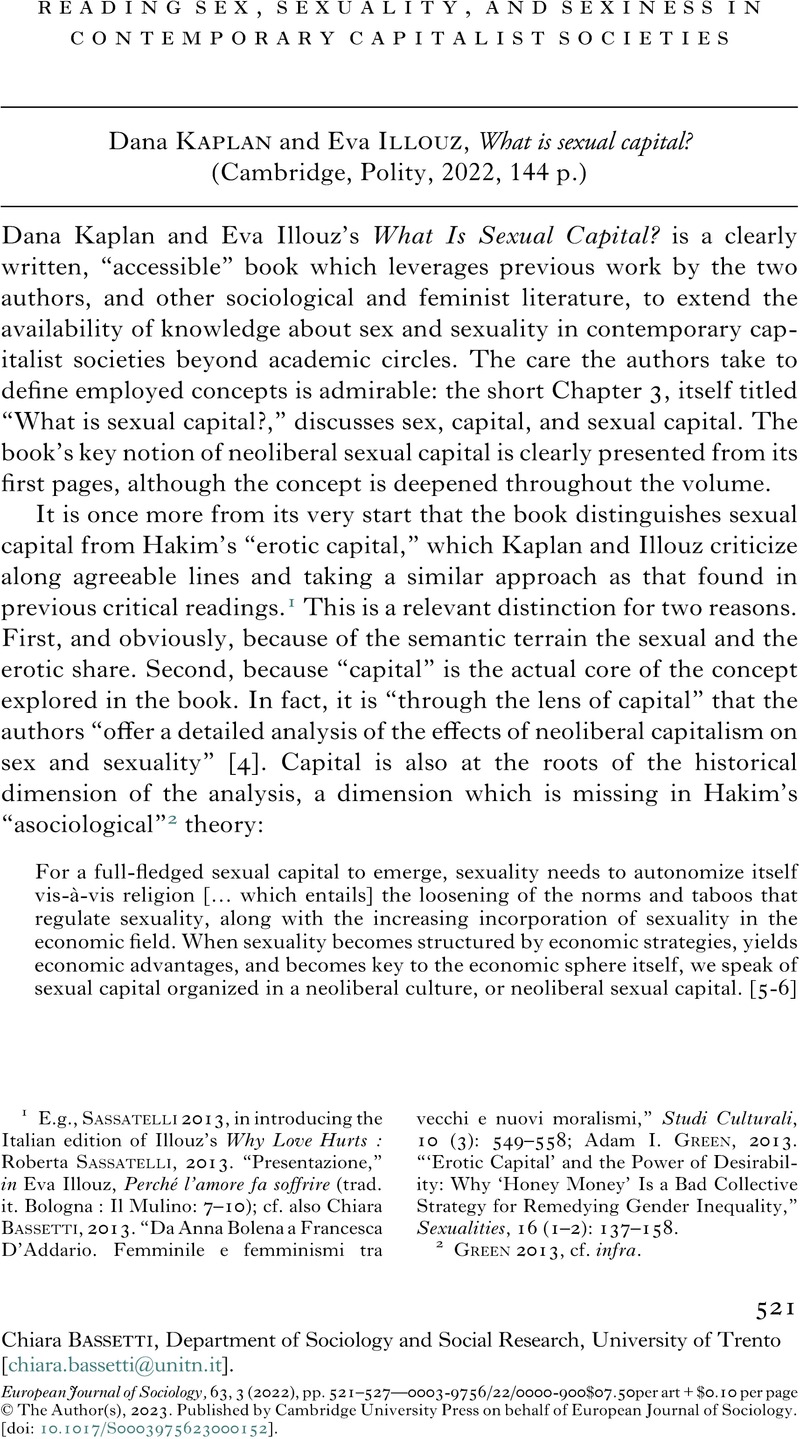No CrossRef data available.
Article contents
Reading Sex, Sexuality, and Sexiness in Contemporary Capitalist Societies - Dana Kaplan and Eva Illouz, What is sexual capital? (Cambridge, Polity, 2022, 144 p.)
Review products
Published online by Cambridge University Press: 23 February 2023
Abstract

- Type
- Book Review
- Information
- European Journal of Sociology / Archives Européennes de Sociologie , Volume 63 , Issue 3 , December 2022 , pp. 521 - 527
- Copyright
- © The Author(s), 2023. Published by Cambridge University Press on behalf of European Journal of Sociology
References
1 E.g., Sassatelli 2013, in introducing the Italian edition of Illouz’s Why Love Hurts : Roberta Sassatelli, 2013. “Presentazione,” in Eva Illouz, Perché l’amore fa soffrire (trad. it. Bologna : Il Mulino: 7–10); cf. also Chiara Bassetti, 2013. “Da Anna Bolena a Francesca D’Addario. Femminile e femminismi tra vecchi e nuovi moralismi,” Studi Culturali, 10 (3): 549–558; Adam I. Green, 2013. “‘Erotic Capital’ and the Power of Desirability: Why ‘Honey Money’ Is a Bad Collective Strategy for Remedying Gender Inequality,” Sexualities, 16 (1–2): 137–158.
2 Green 2013, cf. infra.
3 Laurent Thévenot, 2015. “You Said ‘Capital’? Extending the Notion of Capital, Interrogating Inequalities and Dominant Powers,” Annales, 70 (1): 65–76.
4 Pierre Bourdieu and Jean-Claude Passeron, 1977. Reproduction in Education, Society, and Culture (Beverly Hills, Sage).
5 Eva Illouz herself leveraged Bourdieu’s field theory to develop the concept of emotional capital: Eva Illouz, 2008. Saving the Modern Soul : Therapy, Emotions, and the Culture of Self-Help (Berkeley, University of California Press).
6 Bassetti 2013, cf. infra.
7 This is in line with their reading from neoliberal capitalism; admittedly, Dana Kaplan and Eva Illouz consider literature on “sexual citizenship” only in terms of the commodification of LGBTQ+ instances and identities, quoting for instance Puar’s “homonationalism” [13]. Otherwise, they explicitly maintain a focus on heterosexuality.
8 I was also surprised that the authors’ discussion of “embodied sexual capital” is not connected to a theory of habitus as embodied dispositions and skills.
9 For example, Weber, Foucault, and Illouz’s: Eva Illouz, 2012. Why Love Hurts: A Sociological Explanation (Cambridge, Polity).
10 It should be mentioned that the authors’ discussion of category (1) focuses mostly on (Victorian) England and English-speaking countries, with brief incursions into German-speaking contexts. Moreover, in underlining the role of religion in the valuation of chastity, the authors mention Christianity only, leaving out other monotheisms such as Judaism, cf. e.g., Judith Plaskow and Carol P. Christ, 1989. Weaving the Visions: New Patterns in Feminist Spirituality (San Francisco, Harper Collins); Lynn R. Dufour, 2000. “Sifting through Tradition: The Creation of Jewish Feminist Identities,” Journal for the Scientific Study of Religion, 39 (1): 90–106. Beyond recognized differences in the ways these religions conceive of chastity, it is difficult to avoid seeing commonalities in their contribution to the establishment of a patriarchal moral order and in their ambition to regulate the whole life of individuals—an ambition capitalism has since taken on.
11 Ken Plummer, 2007. “Sexual Markets, Commodification, and Consumption,” in George Ritzer, ed., The Blackwell Encyclopedia of Sociology (Malden, Blackwell: 4242–4244).
12 I use “feminine” rather than “female,” as I maintain a cultural lens here.
13 This also applies to employability beyond the sex industry, cf.: 92.
14 Plummer, 2007. cit.: 55.
15 Martin and George, cit. in ibid.: 76.
16 The latter is an issue Eva Illouz [2008] has previously explored.
17 Dana Kaplan, 2016. “Sexual Liberation and the Creative Class in Israel,” in Nancy L. Fischer, Steven Seidman and Chet Meeks, eds, Introducing the New Sexuality Studies (London, Routledge: 363–370).
18 Eva Illouz, 2019. The End of Love (Oxford, Oxford University Press).
19 I would hypothesize a positive answer to the first question, and I would lean toward the first option for the second question.


